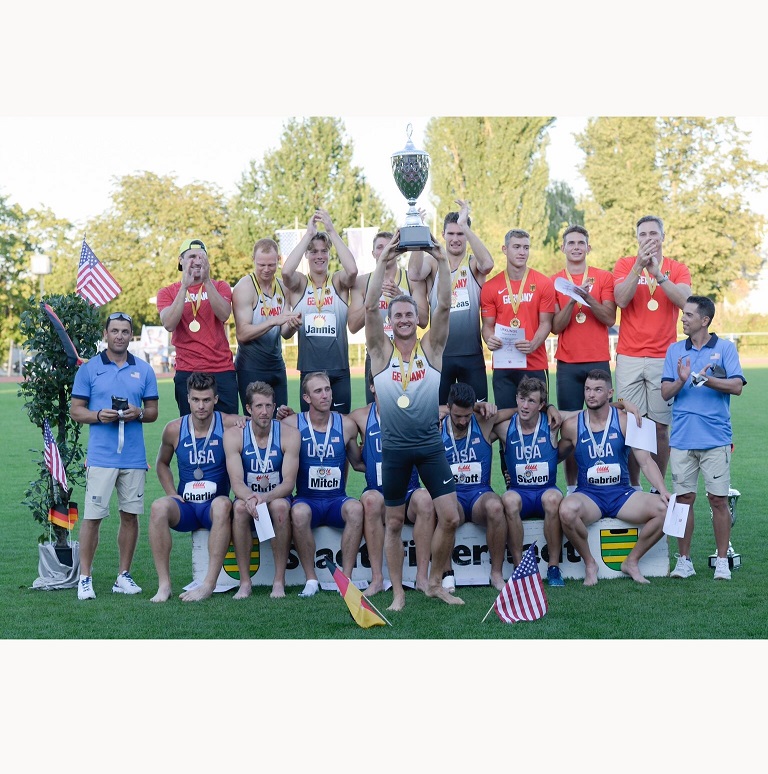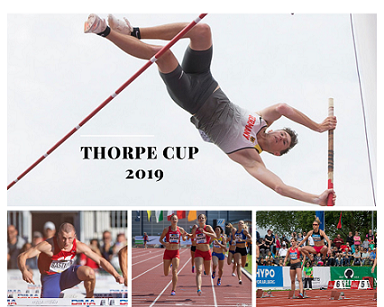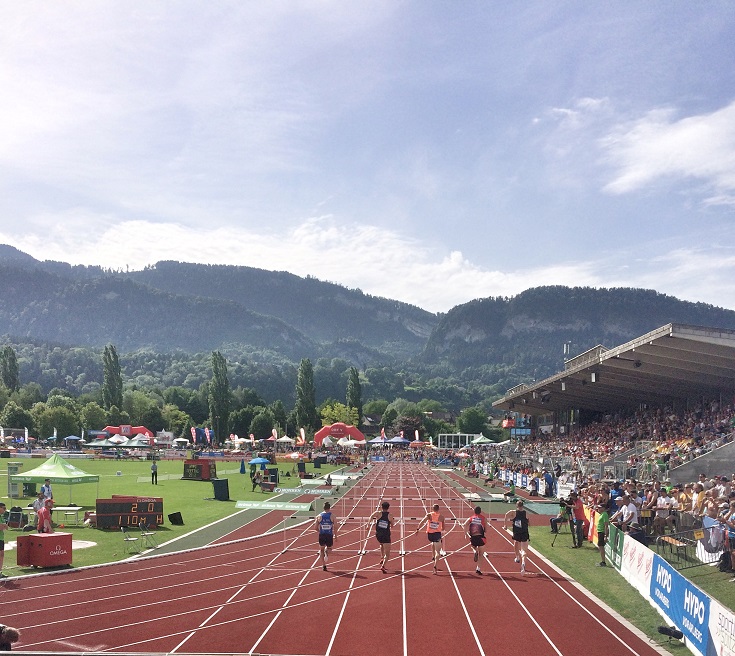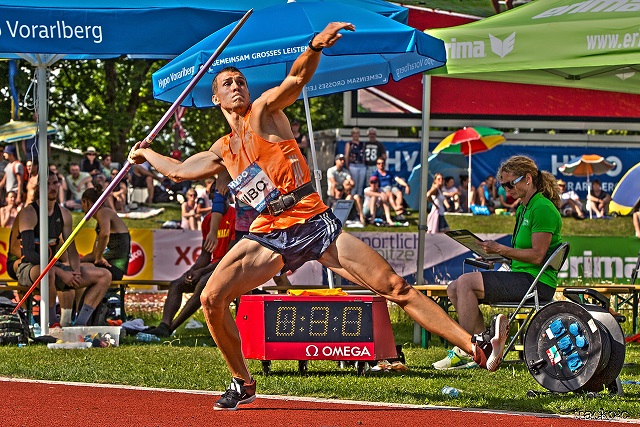Thorpe Cup 2019: Review

“There are two numbers you need to remember,” Zehnkampfteam President Paul Meier told the athletes, their families and friends on Friday night. “If you add together all the Thorpe Cup heptathlon event records, you get 7000 points. If you add together all the Thorpe Cup decathlon event records, you get 9500 points. The Thorpe Cup is world class.”
The Thorpe Cup is world class, but it also plays a crucial role in nurturing the second tier of combined eventers to become top tier performers. The event was graced by some of the world’s best combined eventers who have made that transition, and who are headed to Doha in a few weeks for the World Championships. But the real competition was in three parts. The team heptathlon, the team decathlon, and the home audience’s anticipation of whether Germany’s Andreas Bechmann would break 8000 points for the first time.
HEPTATHLON
First, the heptathlon. The American women led from the start and, in the end, were never overtaken. Michelle Atherley put on a wonderful display of hurdling, at 13.35 three tenths of a second faster than anyone else in the field. Emilyn Dearman and Anna Maiwald were behind her in 13.67 and 13.77. But in the very first heat, the Americans would lose their star decathlete Jordan Gray, as a hamstring tweak caused her to lose her rhythm and stumble over the penultimate and final hurdles. But she wasn’t lost just yet.
Onto the high jump, and there was a sprinkling of star power as 2017 World silver medallist Carolin Schäfer joined the field, clearing the highest height with 1.77. The scoring part of the event was won by Michelle and Emilyn, sharing 1.74. In the shot, the Germans began to catch up with some big throws from Vanessa Grimm (14.37 PB) and Mareike Arndt (14.13). Jordan hobbled to a fourth-place throw of 13.66, and Schäfer took another opportunity to test out her new rotational technique in competition, throwing 13.38.
In the 200, the Germans continued their charge, with a 1-2-3 led by the non-scoring Schäfer in 23.98, and a clean sweep from team captain Anna Maiwald (24.02), Mareike Arndt (24.15). There was also a personal best run of 25.28 from Janina Lange. Overnight, the Americans led the Germans 17393 to 17160.
Day 2 and the long jump was close, with just over 25cm spanning the top 8 marks. The positions at the top were split between countries, USA’s Michelle Atherley and German’s Laura Voss on 6.06, and Lindsay Schwarz and Vanessa Grimm sharing 6.01. But there was a blow for Mareike Arndt and Germany – few elite combined eventers have escaped such a blow – registering 3 no-jumps. The Germans fought back in the javelin with Anna-Lena Obermaier over 45m and Anna Maiwald over 43m ahead of Kendall Gustafson, Vanessa Grimm and Alissa Brooks-Johnson, also all over 40m.
But the deficit was too much to make up, especially with Team USA’s fast 800m runners. Emily Dearman and Michelle Atherley crossed the line in first and second in 2:15, Laura Voss next in 2:18, and Hope Bender and Anna Maiwald fighting to the line in 2:19. A limping Kendall Gustafson was determined to make it to the end and, with 2:33, she scored the last few essential points for the USA to secure victory and a score of 28419, to Germany’s 28245. Anna Maiwald won the overall heptathlon in 5941 and, after the event, the US’s highest finishing performer Emilyn Dearman (second place in 5894) paid tribute to her colleagues, and to the US and German team captains.
“This was such a great group of girls. I thought the college level was awesome - that’s why my first year out of college was difficult, because I’m such a team player - but this group of girls was amazing, I loved it so much. Lindsay helped keep our spirits up, even when Jordan got injured. She wanted to make sure that we stayed on track. And out of the seven US girls, three got injured. Those odds aren’t very good, but they made sure that you were doing everything possible for the team. And Anna was so great – this was my first year and she was just so supportive. This was also my first international meet and it was such a long season. It wasn’t a PR, but I helped my team, so that was great.”
DECATHLON
Onto the decathlon, and the fast men of the USA might reasonably have expected to be the fastest in the field. And fast they were, Steven Bastien and Scott Filip with 10.76, Mitch Modin 10.90 and Gabe Moore 11.02. But Germany’s Andreas Bechmann, despite having a slower PB, was faster than all of them, logging his first lifetime best of the day with 10.73. Bastien continued his form into the long jump with the best leap of the day at 7.60, and Bechmann (7.58), Felix Wolter (7.20) and Jack Flood (6.97) had the best jumps of their career further down the field. Guest Tim Nowak delivered his second-best jump of the year, 7.23, in one of 6 events he did over the weekend. By the end of the long jump, Team USA were ahead by 76 points.
The shot sector in Bernhausen is situated on the outside edge of the track, which meant that spectators could view the competition from all sides, enjoying the action in the circle from under the trees, or in the sunshine along the perimeter. Despite dislocating his shoulder in the long jump, Florian Obst threw 14.94 to lead the field, Gabe Moore closest behind with 14.54 and the Americans taking 5 of the top 7 scores. Jannis Wolff set his first of two PBs in the competition with 12.80. In the high jump, Steven Bastien continued his excellent form, clearing 2m and Jack Flood was also over 2m with 2.03, helping the Americans to extend their lead. Andreas Bechmann returned from – by what would be the day’s standard – a modest shot to set his third PB of the day, clearing a 2.06 decathlon PB. But more was yet to come in the 400, and for the second time that day, Bastien was the fastest going into an event but subsequently beaten by Bechmann, who reduced his previous best time of 48.40 to 47.93.
In the decathlon, the overnight score was USA 20291, Germany 19899. But the talk of 8000 for Bechmann had turned to talk of 8200.
8200 also happens to be the qualifying score for Doha and having secured that in Götzis (while also picking up a shoulder injury in the javelin), Tim Nowak was using the meeting to sharpen up ahead of the pre-Doha holding camp.
“I’m really satisfied with the day”, he said. “The 100 was my second fastest race this year. The start was perfect, and the first 30m really good. The long jump was very good, maybe the 3 best jumps this season - the approach was good, wind was perfect and 7.23 is really good for a first attempt. If the second and third had been good attempts I would have jumped 7.35. The 400 was a race I was really scared of, because I haven’t done that much long sprints since my injury. But today I was faster than in Götzis, so I’m satisfied. The shoulder is good, the structure is completely healed and I just need to get the feeling again for the javelin for the throws. It’s really perfect - couldn’t get better.”
Next morning the US extended their lead further after the hurdles, won by Jack Flood in 14.38. 2017 World bronze medallist Kai Kazmirek joined the field for the discus, finishing third with 44.15 behind Florian Obst (45.47) and Gabe Moore (44.26), while Mitch Modin went over 40m for the first time with 40.36. There was also a 2m lifetime improvement for Bechmann, 36.22 and then 36.93. But with a lead of 767 points the USA lead was now, it seemed, unassailable.
Then, the pole vault happened.
The two pole vault beds were side by side in the stadium, separated only by a channel to allow spectators to wander between them. And there was drama in both. In the first group, Steven Bastien also suffered the curse of the no-height and scored no points. In the second group, there was even more drama. At his opening height, Charlie Card-Childers lost momentum, swinging back on his pole towards the runway, fell from a height and landing painfully. He recovered to take his next two attempts but couldn’t come back from the fall and so also ended up with no-height. Shortly afterwards, Fynn Zenker lost grip of his pole on take-off and landed upside down almost into the box. After treatment, he recovered but was also out of the competition.
At the other end of business, Kai Kazmirek cleared his heights up to 5.10 efficiently and without fuss, keeping Andreas company. And Bechmann was on a mission to bring his outdoor PB of 4.90 into line with his indoor PB of 5.20. He equalled 4.90 with ease, made short work of 5 metres and then was delighted with a new best of 5.10.
And after the pole vault, everything changed. The US’ sizeable lead had been slashed, and the Germans were in front by 232 points. But the Americans brought their game to the javelin, and with it some big, big throws. Team captain Chris Helwick threw 63.75, Gabe Moore a personal best of 61.42. The Germans’ only 60m plus thrower ahead of the event was Jannis Wolff who threw a respectable 58.25.
But the Germans had a secret 10m advantage to deploy. So secret that even the Germans didn't know about it. After improving his 52.19 PB to 54.32 and 54.89 in the first and second rounds, Andreas Bechmann unleashed a massive 61.43m, a PB by almost 10m, almost double the improvement his teammate Niklas Kaul delivered in Gävle and astounding everyone in the stadium, including himself. With only a few dozen points separating the teams going into the 1500m, did Team USA have more to bring?
And so the 1500 became about strategy, and team tactics. For the US, Charlie Card-Childers took out the pace, glancing over his shoulder frequently to check on the whereabouts of his colleagues. Tom-Lucas Greiner tracked him as pacemaker for the Germans, before dropping back to maintain contact with the group.
A few laps in, Charlie stepped off the track on the home straight, sprinting back across the grass to check on progress at the other side. Chris Helwick took up the pace, pushing on and creating a significant gap back to the Germans. Coming into the final 100, Wolff brought his chasing pack closer to Helwick, he and Felix Hepperle going past. Helwick stumbled. He staggered. He fell. He got up. He fell again, doing a forward roll, as Team USA head coach Petros Kyprianou sidestepped alongside him on the home straight, shouting encouragement. He got up again, fell across the line, causing Bechmann to enact a high-speed swerve worthy of the Porsches decorating the Fleinsbachstadion. Greiner completed his race, taking no chances.
At the 200m mark, Germany’s sub Nils Kruse had been calling out the times to his teammates. “I set them the times, and they did great - hopefully they have the win, but we don’t know!”
A decathlon competition is defined not by the numbers on the page, but by the character of the athletes standing on the curved line at the start of the 1500m. Magic happens when decathletes work together in the final event, sacrificing their own scores, and supporting their competitors to reach new heights. That’s something to ponder for those considering the adoption of the Gundersen method in the 1500, a potential move which is unpopular among athletes and fans alike in the combined events world.
But there was no manufactured attempt at excitement here. The German men had won the Thorpe Cup decathlon with 37809, 135 points ahead of the gutsy USA team with 37674. The individual victor was Andreas Bechmann scoring 8132 and becoming, as our statistician friends later told us, the third teenager this year to score 8100+ in a senior decathlon ahead of Ayden Owens and Ash Moloney.
At the midway point en route to his new mark, Bechmann reflected on his performance:
“In the decathlon you need to come into the flow where you have the right stress level. It’s good to start with a fast 100 - taking the speed into the long jump, and you know you can run the 400 as well. A 26cm long jump PB, 1.5 tenths of a second sprint PB, half a second 400 PB, 6cm decathlon PB in high jump…I’m speechless. I’m amazed how well I could stand after the 400m. Didn’t die, didn’t puke, which is a surprise. So, I think I’m in good shape”.
Captain Chris Helwick reflected on how the USA fought hard to the end as a team:
“We did. We did. I feel extremely proud of how we did. Everybody gave it everything they had. We came up short in a couple of pivotal moments, but I don’t have any regrets, and I hope these guys don’t either. I’m sure there’s plenty of disappointment and a little heartbreak - and I’ve got two scraped knees - but otherwise I feel good.”
The crowd sang “Happy Birthday” to Jack Flood who turned 24 on Sunday, and Anna Maiwald and Anna-Lena Obermaier carried the injured but victorious Jordan Gray and Kendall Gustafson around the track on their backs. German captain Felix Hepperle lifted the trophy, gave a stirring tribute to the Thorpe Cup and then called an end to his decathlon career.
Competition renewed, friendships made, and a new wave of German and US athletes helped by the 26th edition of the Thorpe Cup along the road to the top tier of combined events, and to exciting futures.
Link to full results
Link to preview
Photo credit: Markus Schwarz
Statistics credit: Jon Mulkeen





Comments